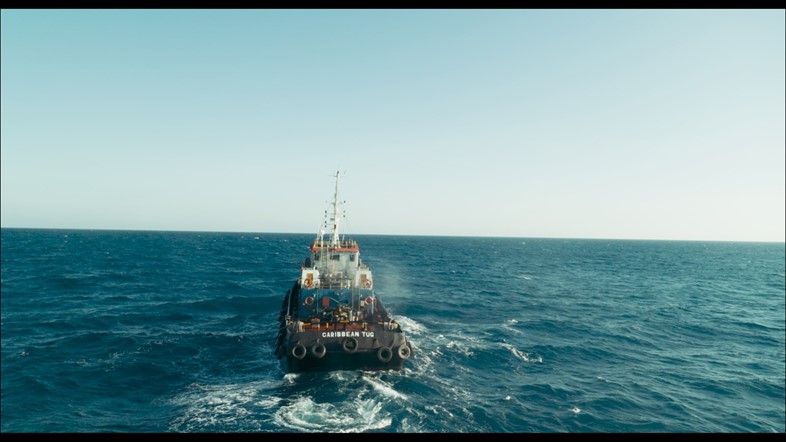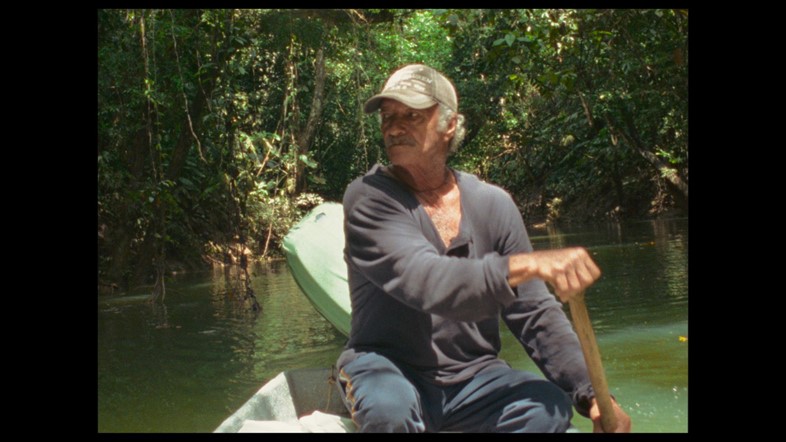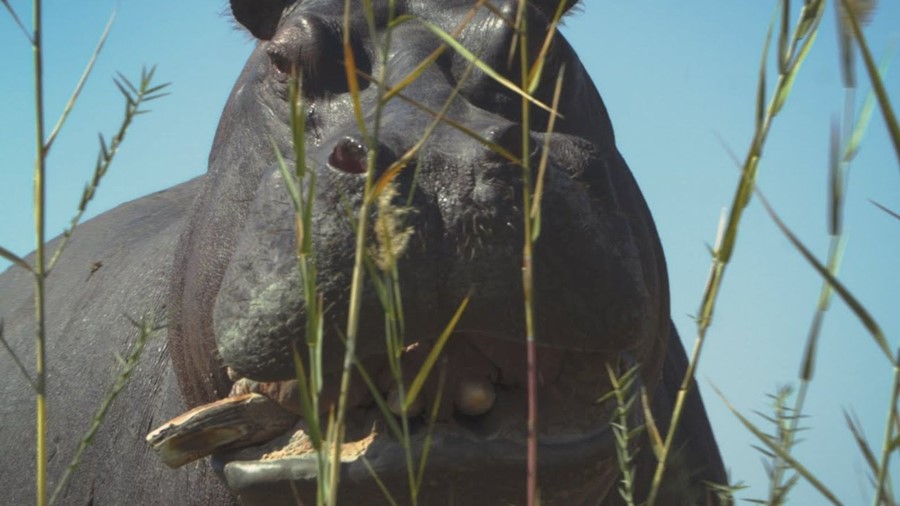Nelson Carlo de Los Santos’s new film is a wild fable of cultural exile and resistance, narrated by a hippo
In the late 1970s, the drug lord Pablo Escobar transplanted a small herd of hippos from Namibia to Colombia. They were kept on his estate until 1993, when he was killed by US and Colombian special forces. After that, the hippos were left to wander free, with 100 of these ‘cocaine hippos’ adapting to their new home along the Magdalena river valley. The Dominican filmmaker Nelson Carlo de Los Santos Arias, who won the Silver Bear for Pepe, was initially drawn to this story not through the grandeur of this particular history but from the story of a single hippo’s fate.
“The film was based on this story that Camilo Restrepo, an artist, told me about one of Escobar’s hippos,” says the director. “If a young male hippo fights with the alpha of his bloat and loses, he is expelled from the group; if he’s lucky he finds another group. However, since this hippo [Pepe] was moved to Colombia, there were no others like him, [so] he wandered in exile all alone. This was devastating to me – the image of the hippo alone, especially with the knowledge [of what came] after.” Carlo de Los Santos Arias examines the complex intersections of colonialism and displacement in the Caribbean through speculative fiction that places the tragic impossibility of this exile at the heart of the film.
Pepe is structured around a monologue delivered by this solitary creature in Spanish, Afrikaans and Mbukushu, a voice that shifts linguistically along his own journey of exile. First, he is only able to utter sounds – “He He He … Ah … Ee … Oiii” – before learning language and gaining a new form of consciousness, questioning his own identity and belonging: “How do I know these words? How do I know what a word is?” Carlo de Los Santos Arias explains: “The monologue is the spine of the film. It became a philosophical statement, a political statement that was embedded in every shot that I took. It was very clear to me from the genesis to tell this film through a fantastic character, a fable.”
In a similar mode to Mati Diop’s Dahomey, Carlo de Los Santos takes speculative fantasy as a mode to examine histories of colonialism; giving voice to the historically voiceless, the hippo’s story is a clear parallel to histories of the Middle Passage. But Pepe challenges cinematic as well as historical narratives, with wild experimentation and an epic, elliptical structure. Composed of 16mm black-and-white footage, digital colour, night-vision cameras, drone shots and even empty black-and-white frames cut together with a poetic flow, Carlo de Los Santos Arias tells AnOther of his desire for experimentation: “I went to both film and art school. In film school, they teach you that film is a product. In art school, we thought of film as an object. I’m interested in what it means to create a film that has materiality and has a body, with cinema as a language.”

Most of the film is shot by the director himself, who would often spend days travelling through the jungle to track the hippos, only to capture brief moments of the drama that he required. “The way the light hits the film is quite personal to my vision, my state of mood, and a detail that is very difficult to direct another person to do,” he explains. “For the images, I’m relying on my own sensibilities rather than a rational process.” Moreover, Carlo de Los Santos Arias composed the score of the film, which acts as a drive to the tempo of the narrative progression: “The sound design always comes first for me, because it is impossible to understand the perception of time, of the duration, of the feeling, of the flow without it.”
The film is divided loosely in two sections. For the first part, we see a brief prelude featuring news footage of Escobar’s death in 1993, followed by a chronological journey of the hippos’ journey from Nambia. In the first, we follow a group of German tourists on safari, and their colonial gaze and attitude to the local communities, before following Pepe on his epic journey over land and sea. “From the beginning of my career, even on my first short film, I was testing out many formats – I was dependent on what cameras people would lend me. But the film is also a visual exposition of Caribbean identity, one that is composed of all these different languages, intonations and histories, which is relational and creolised. It’s a Frankenstein of a film in a way.”

In the film’s second part, Pepe shifts away from being our protagonist to the mythical, hunted outsider figure portrayed by local fishermen who live in a small village along the River Magdalena. We witness their daily lives, a striking beauty pageant sequence, and a hunt for our eponymous hippo along the river. “I didn’t think about it in two parts, but rather a continual exploration of the power structures and the symbolic figure of the macho – which is the problem with Pepe, with Pablo Escobar and with the fishermen,” says Carlo de Los Santos Arias. “What the film is actually addressing is the constitution of the alpha, that sometimes leads to a dictatorship, to violence, not just between people, but in the ways humans dominate these landscapes.”
As the credits roll at the end of the film, we read that Pepe is the first in a series of works called Studies of the Imagination. Carlos de Los Santos is interested in moving away from the “Americanisation” of cinema which has been the “visual brain of the imperial world, influencing children from a very young age to read images and symbols in a particular way.” Instead, he is interested in creating a Caribbean cinema which places imagination in a political context: “I mean, how does a hippo speak? It is something that is full of imagination. I believe we need imagination in the political arena to imagine a world that does not yet exist – not just fantastical themes, but new forms of love, of feelings.”
Pepe will premiere at the London Film Festival on October 17.
